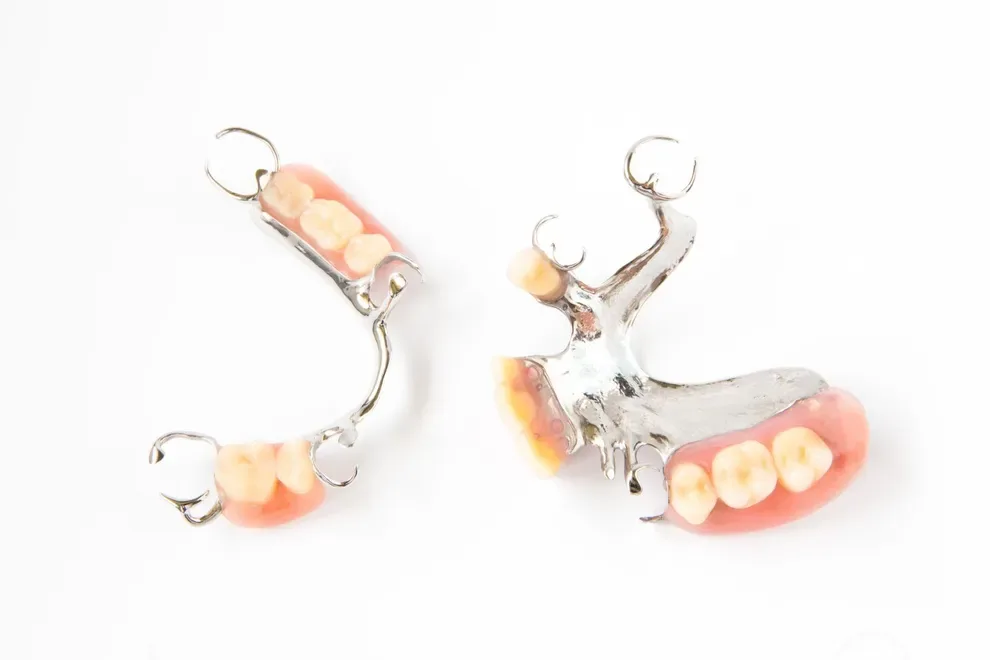Flipper Tooth: Pros & Cons of a Partial Denture

Table of Contents
- What Is a Flipper Tooth
- Pros of a Flipper Tooth
- Cons of a Flipper Tooth
- Flipper Tooth vs Other Denture Types
- Costs of a Flipper Tooth
When you lose one or more teeth, or need to have teeth removed, you will need a replacement. Dentures are a removable option for replacement teeth that can improve your quality of life by helping you to eat, talk, and smile better. A flipper tooth is a type of removable and partial denture that is made from acrylic.
A flipper tooth is affordable, can be made quickly, and matches your natural tooth color. The drawbacks to a flipper tooth are durability and comfort. A flipper tooth is generally designed to be used on a short-term basis while waiting for a more permanent option.
What Is a Flipper Tooth?
A flipper tooth is a removable acrylic partial denture that is typically used as a temporary option, although some people do choose to keep them on a long-term basis. It can help to fill the gap left behind by a lost or extracted tooth.
If you have a tooth extracted, it can take time for the site to heal enough to place a more permanent option, such as a dental implant or bridge. A flipper tooth can be a good placeholder in the meantime.
A removable partial denture involves a replacement tooth or teeth attached to a gum-colored base.
If your jaw is not done growing and you lose a permanent tooth, your dentist can offer a flipper tooth to be used until you are around 18 years old and ready for a more permanent option.
The dental flipper is made from a dental acrylic material that can come close to matching your natural teeth and gums. It is housed in gum-colored material that can be taken out to clean and at night. It can also be attached to your teeth with clasps.
Pros of a Flipper Tooth
A flipper tooth can help to improve your self-confidence by making you more apt to smile without a gap or missing tooth. It can also make it easier to chew, eat, and talk, and this can enhance your overall quality of life.
Some of the additional pros of a flipper tooth include their:
Flipper teeth are generally more cost effective than other tooth replacement options.
A flipper tooth can often be fabricated before your tooth is even extracted. This means the extracted tooth can be replaced immediately.
A flipper tooth is designed to match your gums and teeth as closely as possible.
A flipper tooth can keep your teeth from shifting after the loss of a tooth.
A flipper tooth is easy to wear, take out, clean, and replace.
Flippers are one of the least invasive types of tooth replacements, and they consist of a gum-colored plate and a replacement tooth or even teeth.
Cons of a Flipper Tooth
A flipper tooth is generally designed to be a short-term fix, so they are not made to last very long. These removable partial dentures are not made for strength and durability, and they will often require frequent replacements if you choose to wear them long term.
They can also loosen over time. Compared to metal framework dentures, flipper teeth can be more brittle, deteriorate faster, and not hold up as well to chewing and regular daily use.
People often complain that a flipper tooth is uncomfortable, and it can also put too much pressure on your gums and bone, causing further damage. Acrylic partial and removable dentures can also cause significant periodontal injury, studies show. Some people may be allergic to the acrylic material and therefore not suited for a flipper tooth.
While flipper teeth work for many people, they don’t work for everyone. It is not always beneficial to go for the less expensive and more convenient option. Talk to your dentist about what works best for your particular situation.
How a Flipper Tooth Compares to Other Types of Dentures
Other types of dentures can offer more durability and a better fit, even if they are going to cost a little more and take more time to fabricate. Types of dentures include full (or complete) dentures, those that are attached to implants, and other partial dentures using metal or plastic materials.
Full dentures are a complete set of artificial teeth. They can be made out of a variety of materials. Partial dentures only replace a few teeth, not all of them.
Dentures that are attached to implants are going to be more stable, comfortable, and secure than a flipper tooth or other forms of partial dentures. Partial dentures that are made from metal are less natural looking than a flipper tooth. As a result, they can be less appealing, but they are much more durable.
Flexible partial dentures are made out of a plastic material instead of acrylic. They can therefore be a good choice if you have an acrylic allergy. They will need to be completely replaced if they crack or break, which generally makes them a temporary solution.
Costs of a Flipper Tooth
A flipper tooth typically costs between $300 and $500, depending on how many teeth are being fabricated and replaced, the location in the mouth, and your dentist. Removable partial dentures, in contrast, typically cost between $650 and $2,500 for a set. Flexible partial dentures can range in price from $900 to $2,000, on average.
Flipper teeth can be less expensive up front than other forms of dentures, but they often do not hold up and need to be replaced multiple times. This can increase their lifetime cost.
